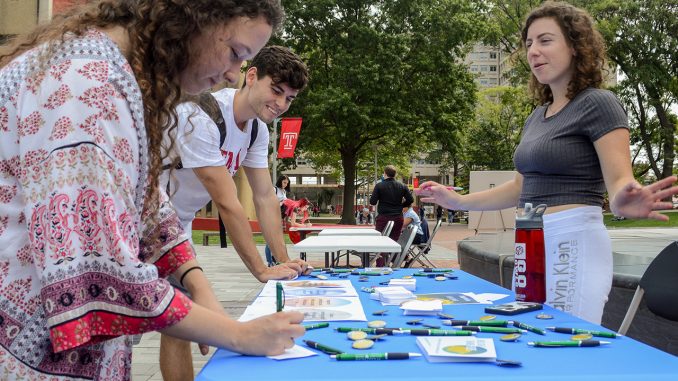
September is National Suicide Prevention Awareness month, but Temple University’s Wellness Resource Center works year round to address mental health issues on campus.
This month, the WRC hosted its annual “Shed Some Light” event, which informs students of on-campus mental health resources, while also destigmatizing mental health issues, said Liz Zadnik, assistant director of the WRC. The event hopes to reduce barriers students face when accessing mental health care.
The WRC is Temple’s health promotion office focused on helping the campus community understand wellness and self-care.
Suicide is the second most common reason for deaths of people between 10 and 43, according to a 2017 study by the Center for Disease Control. It is the leading cause of death among college and university students in the United States, the Suicide Prevention Resource Center reported in 2014.
This year, the WRC is rolling out a new suicide prevention training called Question Persuade Refer. Two of Zadnik’s colleagues are certified in this training that focuses on how to stay calm and connected to a person who discloses they are contemplating suicide and how to react without panicking.
“It’s all a muscle,” Zadnik said. “Listening and truly listening to hear rather than listening to respond is something that takes practice.”
The WRC also offers peer education, which gives students various peer-facilitation certifications. This gives students the option to have conversations with a peer instead solely a professional or an authority figure, Zadnik added.
Peer educators help the WRC with campus outreach, assist in WRC events and can become a nationally certified peer facilitator.
Athena Vafiadis, a senior neuroscience major, is a mental well-being program assistant and HEART peer at the WRC. Vafiadis said she supports WRC’s mission because she “fell in love” with promoting mental health on Temple’s campus.
“Promoting mental health on a college campus and seeing how big of a problem it is and how to address it starts with peers. Vafiadis said. “It kind of grows to the faculty caring about mental health, and then the institution and then the community at large.”
Vafiadis created Owls Stop Stigma, a new WRC event, which will be held on Oct. 10th for World Mental Health Day. The program explores origins of mental health stigma, how students can identify and support friends who may be struggling and how individuals can be an agent of change in reducing stigma.
Alisa Polyak, a senior biology major and a WRC safer-sex peer facilitator, trained in programming that promotes sexual health, attended “Shed Some Light” as a WRC representative. Polyak said her position taught her skills to use when faced with stressful situations.
“It’s very important to know about these resources because you can learn how to help your friends, peers, family and yourself,” she said.
The WRC, along with Tuttleman Counseling and Employee and Student Health services, are continually working to create resources for the Temple community who may be struggling with mental health issues, Zadnik said.
“This is a multi-pronged, multi-goaled effort, so we want to make sure that people are aware of the resources that are available to them, and reduce any barriers to them accessing those services,” she added.


—-destigmatizing mental health issues, said Liz Zadnik, assistant director of the WRC
I do not teach they are stigmatized, I do teach people to be wary of those who do.
Harold A. Maio, retired mental health editor